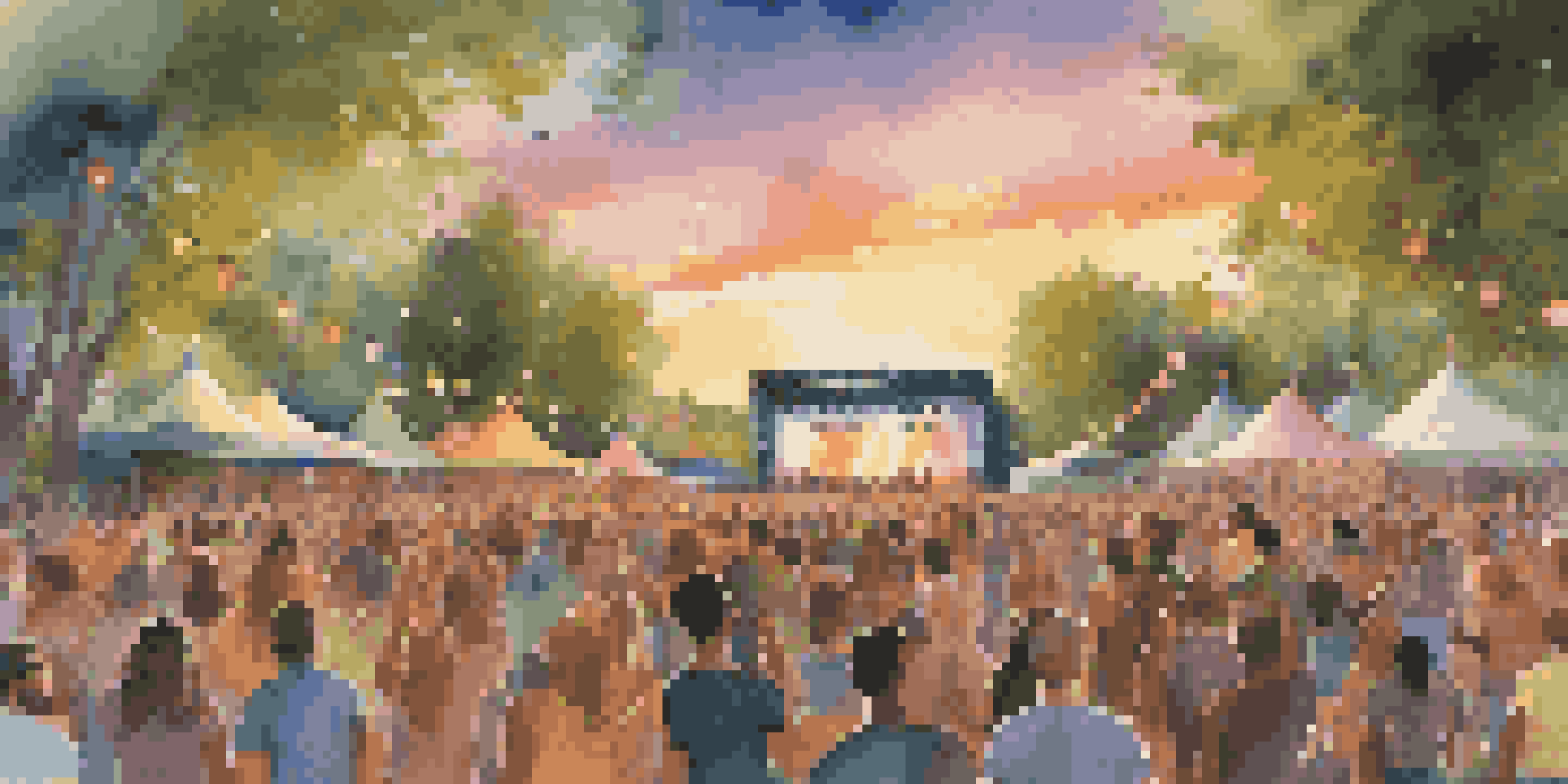Music as a Reflection of Generational Identity

The Role of Music in Shaping Cultural Identity
Music serves as a powerful medium for expressing cultural identity. It captures the essence of societal values, norms, and experiences unique to each generation. For example, the folk tunes of the 1960s echoed the civil rights movement, while today's hip-hop often reflects social justice issues.
Music is the shorthand of emotion.
By listening to the music of a particular era, we can glean insights into the collective mindset of that time. This connection allows listeners to feel a sense of belonging, as they resonate with the themes and emotions expressed in the lyrics and melodies. In this way, music becomes a time capsule of cultural identity.
Moreover, the evolution of musical genres often mirrors shifts in societal values. As new genres emerge, they provide a soundtrack to the changing landscape of life, influencing how generations view themselves and their place in the world.
Generational Trends: The Soundtrack of Our Lives
Each generation tends to gravitate toward specific musical styles that resonate with their experiences. For instance, Baby Boomers often identify with rock and roll, reflecting their rebellious spirit and desire for change during the 1960s. Conversely, Millennials have embraced pop and electronic music, often emphasizing themes of self-expression and digital connectivity.

These trends not only showcase preferences but also reveal the emotional landscapes of each generation. Music acts as a reliable barometer for gauging what matters most to a group of people at a given time. This connection can be seen in how different age groups respond to various musical movements, highlighting their unique values.
Music Reflects Cultural Identity
Music serves as a powerful medium that embodies the values and experiences of different generations, acting as a time capsule of cultural identity.
As we explore these musical trends, we uncover stories of resilience, joy, and struggle that define each generation. This shared experience through music fosters a sense of unity and belonging, even among those who may not share the same background.
The Influence of Technology on Music and Identity
Technology has dramatically transformed how we create, consume, and share music across generations. From vinyl records to streaming platforms, each advancement has changed the musical landscape and, in turn, shaped generational identities. For example, the rise of the internet allowed for a global exchange of musical styles, influencing everything from pop to indie genres.
Without music, life would be a mistake.
This technological shift has also altered the way music is marketed and experienced. Today's younger generations often discover music through platforms like TikTok, where short clips can propel songs into mainstream success. Such platforms create communities around music, where shared identities are formed and celebrated.
Moreover, technology has empowered artists to express themselves authentically, leading to a diverse array of voices. As each generation finds its unique sound through these tools, they simultaneously carve out their identity in the vast musical landscape.
Lyricism as a Reflection of Generational Challenges
The lyrics of a song often reflect the struggles and triumphs of a generation, acting as a narrative of their experiences. For instance, the angst and disillusionment expressed in grunge music during the '90s resonated with a generation grappling with economic uncertainty and changing social norms. Similarly, today's artists often tackle themes of mental health and identity in their lyrics.
Through storytelling, musicians can articulate feelings that many may struggle to express, creating a sense of solidarity among listeners. These shared experiences often foster a deeper connection, as individuals find comfort in knowing they are not alone in their struggles. The emotional weight of these lyrics can be a powerful catalyst for change.
Generational Trends in Music
Each generation gravitates towards specific musical styles that reflect their unique experiences, shaping their emotional landscapes and sense of belonging.
As we analyze the lyrics that define each generation, we uncover the pressing issues that shaped their worldview. This lyrical exploration not only reveals what mattered to them but also serves as a reminder of how music can inspire action and reflection.
Music Festivals: Celebrating Generational Unity
Music festivals have become significant cultural events that unite people from different generations. These gatherings celebrate a diverse range of musical styles, allowing attendees to connect over shared experiences and favorite artists. Festivals like Coachella and Glastonbury attract a mix of ages, creating a unique environment where generational barriers fade away.
At these events, you can see parents and children bonding over classic acts alongside emerging artists, highlighting the timeless nature of music. This intergenerational exchange fosters dialogue and understanding, allowing individuals to share stories about how certain songs or artists have influenced their lives.
Furthermore, the communal experience of live music amplifies the emotional connections people feel to their favorite songs. As attendees sing along to tracks that have defined their lives, they create lasting memories that celebrate their generational identity.
The Globalization of Music and Its Impact
With the world more connected than ever, music has transcended borders, creating a global tapestry of sound. This globalization has allowed younger generations to experience and adopt influences from various cultures, leading to a rich blending of styles. For example, the rise of K-pop has introduced global audiences to music that incorporates traditional Korean elements with modern pop.
As a result, younger generations are more open to diverse musical influences, which can shape their identity in unique ways. This cultural exchange fosters a sense of unity and shared experience across geographical divides, allowing people to find common ground through music.
Technology Shapes Music Experience
Advancements in technology have transformed how music is created and consumed, influencing generational identities and fostering diverse artistic expressions.
In this interconnected world, music serves as a universal language that expresses complex feelings and ideas. As generations continue to embrace this diversity, they shape their identities, celebrating the rich tapestry of influences that define their musical landscape.
The Future of Music and Generational Identity
As we look to the future, the relationship between music and generational identity will undoubtedly evolve. New genres will emerge, influenced by technological advancements and cultural shifts, reflecting the experiences of future generations. This ongoing evolution will continue to show how music serves as a mirror to societal changes.
Additionally, the rise of artificial intelligence and virtual reality in music creation and performance promises to reshape our listening experiences. These innovations may offer new ways for generations to connect with music, further deepening their sense of identity.

Ultimately, as each generation adds its voice to the musical landscape, they contribute to a broader narrative that reflects our shared humanity. The future of music remains bright, with endless possibilities for expression and connection.